Judge Warns Michael Cohen To Stop Trashing Trump on TikTok Ahead of Monday’s Testimony, as Trump Calls Trial ‘Legally Obscene’
Prosecutors told the judge, Juan Merchan, that they have been unable to control Cohen, who’s been regularly denouncing Mr. Trump.

The judge presiding over President Trump’s hush money case ended the trial’s third week by sending a warning to Michael Cohen, who is expected to testify on Monday.
“I would direct the people to communicate to Mr. Cohen that the judge is asking him to refrain from making any more statements about this case,” New York Supreme Court Justice Juan Merchan said on Friday afternoon, before he sent participants into the weekend.
“That comes from the bench and you are communicating that on behalf of the bench,” the judge said.
One of the defense attorneys, Todd Blanche, had raised the gag order issue again, citing that Cohen, Mr. Trump’s former lawyer and current nemesis, had just released a TikTok video in which he wore a white T-shirt with a photo of Mr. Trump behind bars. Mr. Blanche further said that Cohen has spoken about running for Congress.
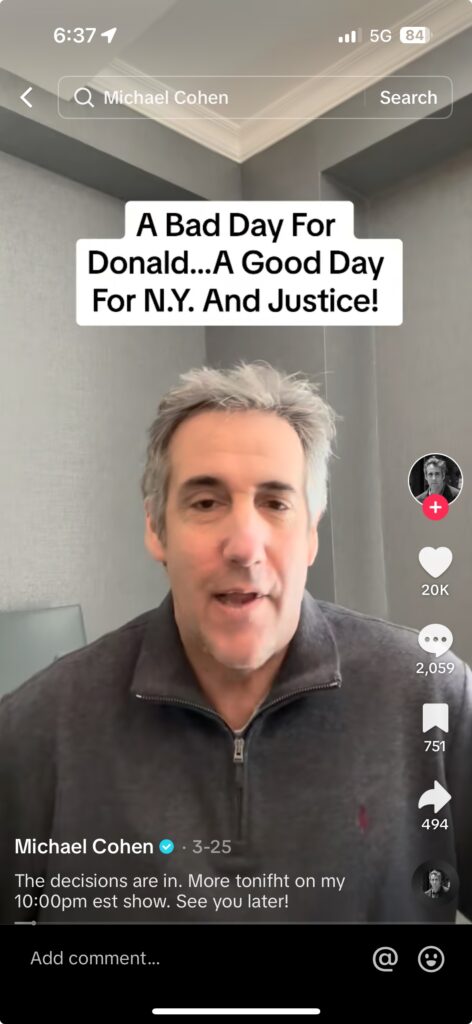
“It’s becoming a problem every single day that President Trump is not allowed to respond to this witness,” Mr. Blanche insisted. “He has stated on social media that he is going to stop talking, and he doesn’t.”
One of the prosecutors, Joshua Steinglass, assured the defense that they had “repeatedly” asked Cohen to refrain from commenting on Mr. Trump in public. Cohen is expected to testify in the trial on Monday.
After the proceeding Mr. Trump spoke to court reporters for more than ten minutes, saying that “this case is becoming legally obscene.”
Mr. Trump felt ridiculed by the judge’s attempt to silence Cohen without issuing an official gag order. “What the judge did was amazing, actually it was amazing. Everybody can say whatever they want. They can say whatever they want. I’m not allowed to say anything about anybody,” Mr. Trump lamented.
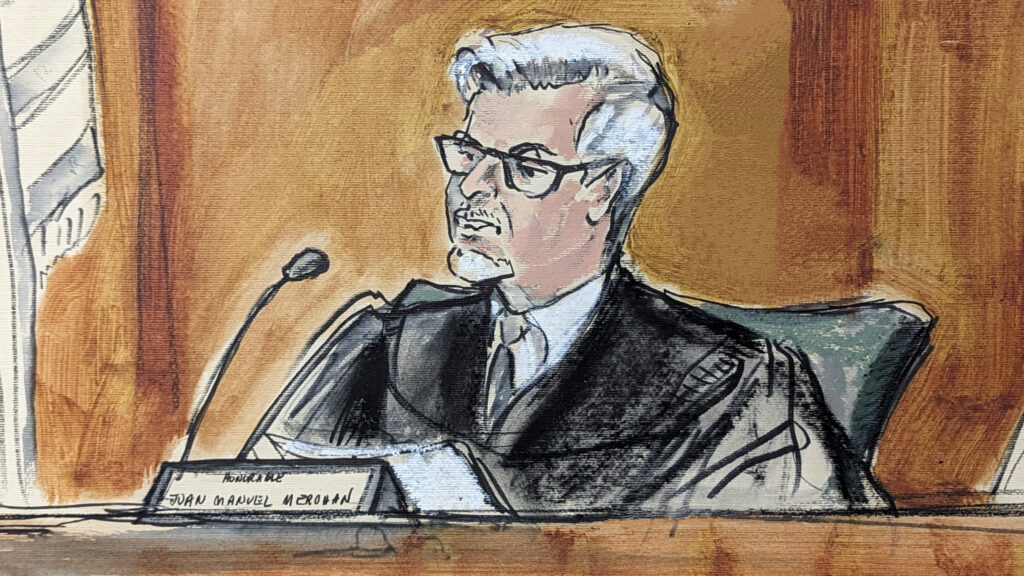
According to his attorney Mr. Blanche, imposing a gag order on Cohen would lie within the judge’s legal authority. The judge could also, in a simpler fashion, issue a protective order against Cohen. But the judge recently stated that Cohen is not the defendant in the case, Mr. Trump is. Another reason – which the judge did not bring up – could be that Mr. Trump has a much larger social media following than Cohen, who on Twitter has 621,900 followers, a fraction of the seven million people who follow Mr. Trump on his Truth Social platform. Not to mention that some of Mr. Trump’s most fervent followers have been known to harass and threaten the people Mr. Trump publicly attacks.
In another significant development, Judge Merchan suggested that Allen Weisselberg, the longtime and former chief financial officer of the Trump Organization, who is currently serving a five-month prison sentence on New York’s Rikers Island after he pleaded guilty to committing perjury in the Trump Organization’s recent civil fraud trial, could be called to testify in the criminal case outside the presence of the jury.
Weisselberg could potentially be an important witness because he oversaw Mr. Trump’s finances at the Trump Organization, especially after Mr. Trump moved into the White House in 2017.
A defense attorney, Emil Bove, had argued Weisselberg’s two million dollar severance agreement should not be allowed as evidence, while the prosecution said the agreement “offers a real explanation for why he is not going to be here in this trial.” Christopher Conroy, who argued for for the district attorney, said the agreement precludes the prosecution from talking to Weisselberg, “otherwise he will lose $750,000.”
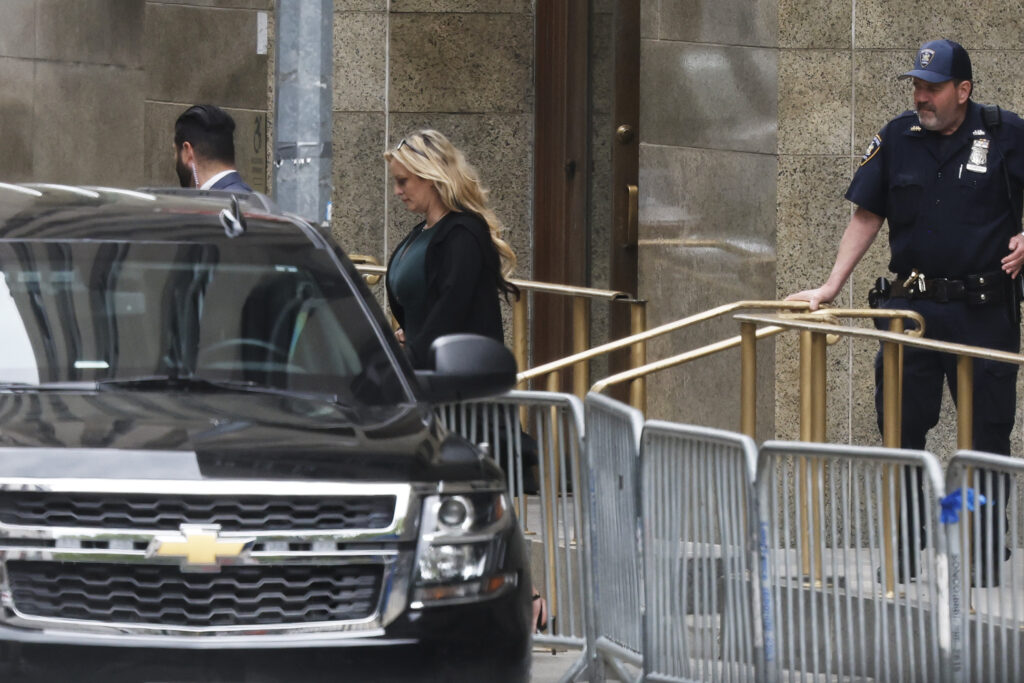
But Mr. Bove disagreed. Weisselberg was not here to testify, he said, because the Manhattan district attorney’s office forced a perjury plea on him and sent him to prison. Judge Merchan did not rule on the issue but recommended that instead of jumping “the gun”, the parties could find a solution “to get him here.”
Mr. Weisselberg would appear to be key to the case that the Manhattan district attorney, Alvin Bragg, has brought against the former president, as it alleges the falsification of business records.
Mr. Bragg, who entered the courtroom around 11 am, accuses Mr. Trump of directing Cohen to pay hush-money to the adult film star Stormy Daniels, whose real name is Stephanie Clifford, shortly before the 2016 presidential election to keep her from publicizing her claim that she had a one-time sexual encounter with Mr. Trump during a celebrity golf tournament at Lake Tahoe in 2006. Mr. Trump has denied the allegation. According to the prosecution, Mr. Trump reimbursed Cohen the $130,000 he paid Ms. Clifford in 2017, but illegally disguised the payment as a legal expense.
“And you know what we’re talking about, 2016,” an animated Mr. Trump told court reporters on Friday afternoon. “We’re talking about something that goes back to… 2006… We’re taking a fender bender charge that’s 18 or 19 years old. So fake, the whole case is fake.”
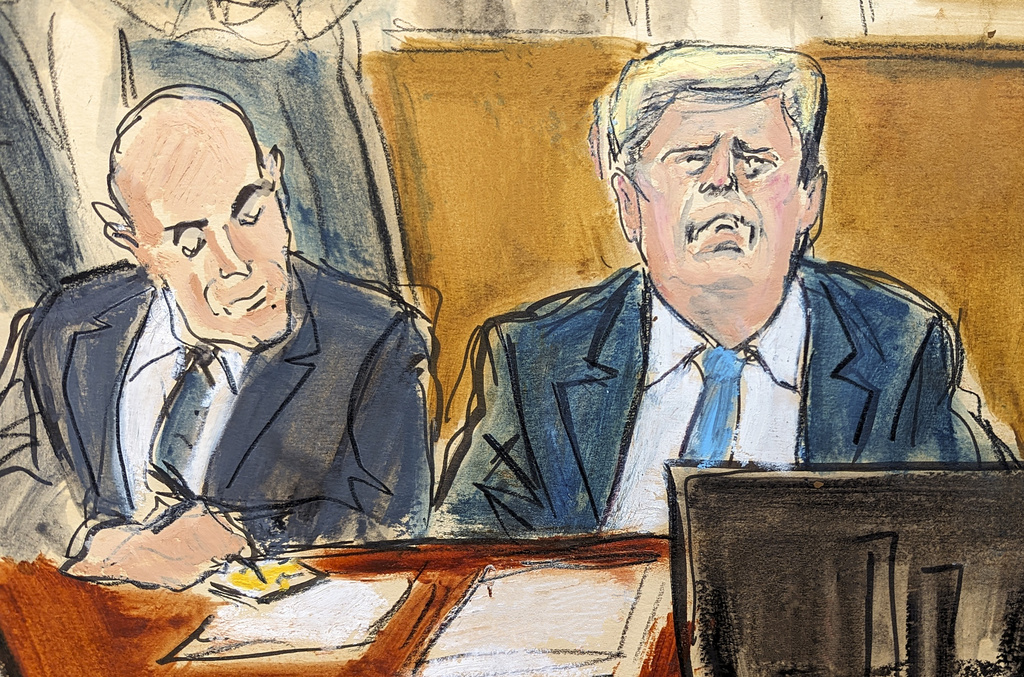
The defense tried to establish that Weisselberg may have authorized these and other payments without Mr. Trump’s direction to do so, when they cross-examined Mr. Trump’s personal assistant from the White House, Madeleine Westerhout.
“I’m correct that you don’t ever have a recollection of Donald Trump and Allen Weisselberg speaking in his first year in office?” One of the defense attorneys, Susan Necheles asked the witness, referring to 2017, when Mr. Trump began his presidency.
“That’s correct, yes,” replied Ms. Westerhout, a trusted gatekeeper to Mr. Trump whose desk was right outside the Oval Office.
Ms. Westerhout, who was fired in 2019 after she was caught telling reporters that Mr. Trump didn’t like to be in photos with his daughter, Tiffany, because he thought she was overweight (Ms. Westerhout later made amends and is on good terms with her former boss), cried on the witness stand as she remembered her time working for Mr. Trump.

She said he was, “a really good boss,” and that “he never once made me feel that I didn’t deserve that job.” She added that, “Especially in an office filled with older men, he never made me feel like I didn’t belong there.”
She also told the jury that Mr. Trump would sometimes dictate his tweets to her, and that he liked to use “the Oxford comma,” the controversial punctuation mark used to separate the last item when listing things. Ms. Westerhout said he didn’t use computers or email. He preferred, she said, to deal with hard copies, papers, and documents. As she spoke in the courtroom, Mr. Trump was going through a pile of papers, spread over the defense table, taking notes, and passing notes to his attorneys.
Remembering her time in the White House, Ms. Westerhout recalled that the former president made sure the Resolute Desk inside the Oval Office was “pristine.” She said he would use the Oval Office for meetings and when he worked, preferred to be in the dining room.
Ms Necheles, the defense attorney, attempted to discredit the established image of Mr. Trump micromanaging his business, and being in control of every detail. “You said he signed a tremendous amount of documents … commissions, proclamations, executive orders, memos, letters … hundreds of documents a day?” Ms. Necheles asked Ms. Westerhout, who although testifying for the prosecution made many comments favorable to the defense.
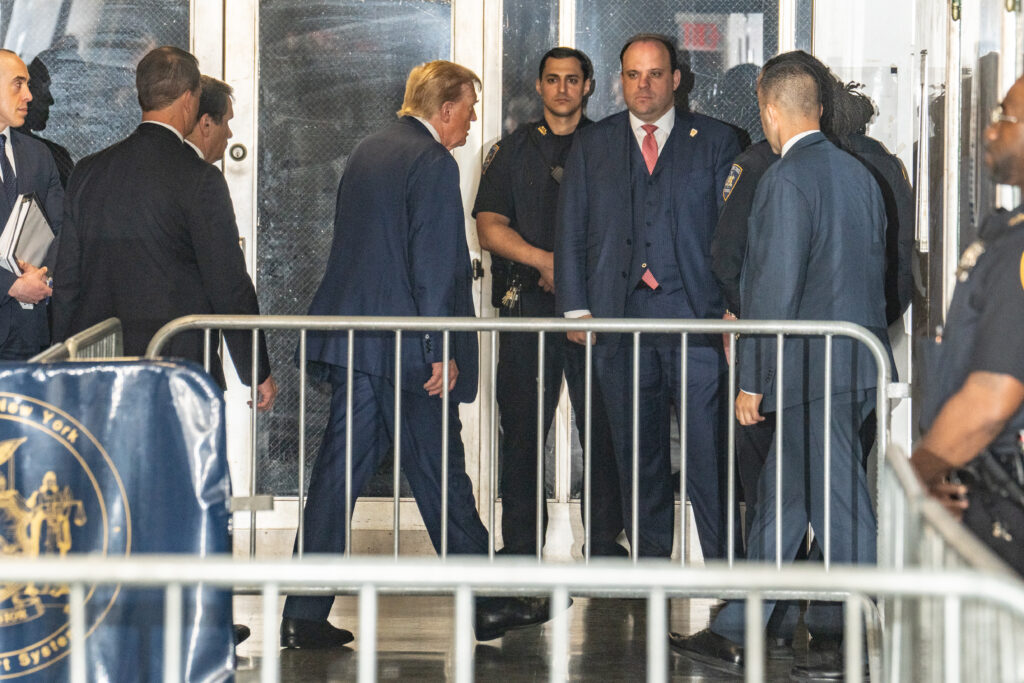
“Not every day, but sometimes,” Ms. Westerhout testified.
“Sometimes he would sign checks without reviewing them?” Ms. Necheles asked.
“Yes,” Ms. Westerhout replied.
Ms. Necheles also asked Ms. Westerhout about the 2018 article published by the Wall Street Journal that reported Ms. Clifford’s hush money payment. Ms. Westerhout said, “I could just tell that the whole situation was unpleasant.”
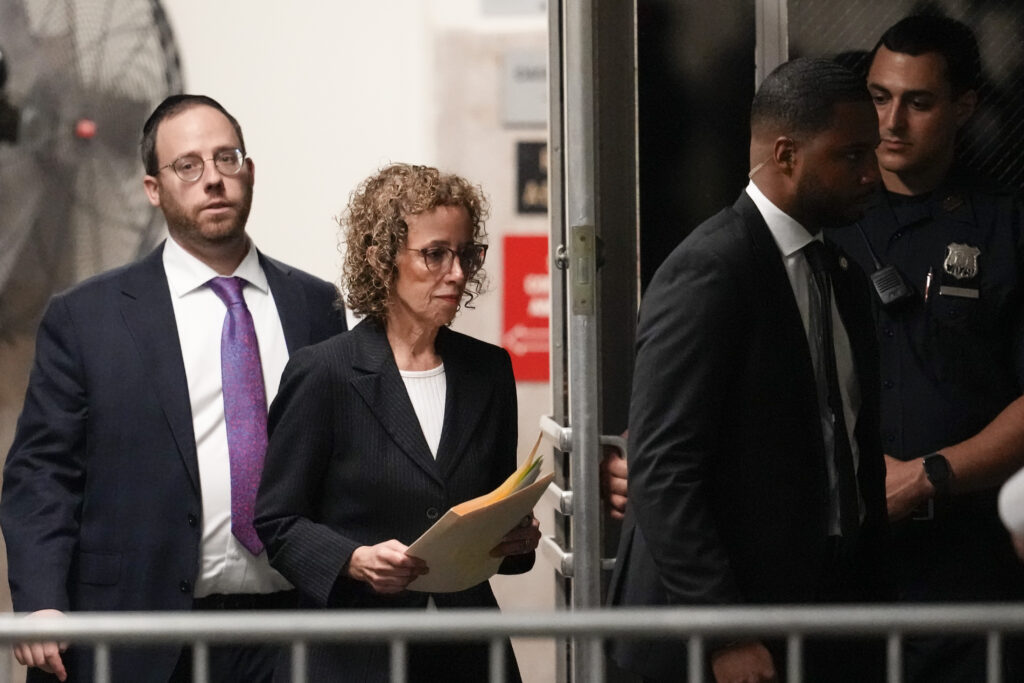
The defense scored another victory after the mid-morning break, when Judge Merchan ruled that a Larry King interview Mr. Trump did in 1999 could not be entered as evidence.
In the interview, Mr. Trump speaks about having knowledge on campaign finance laws, and the prosecution wanted to use that to show that Mr. Trump was and is well aware of the campaign finance laws he allegedly violated in 2016. But the judge agreed with the defense that the interview was simply too old.
“You are asking the jurors to draw an inference that because Mr. Trump knew the laws in 1999, he knew them in 2016,” Judge Merchan said. “That’s a lot of speculation.”
Prosecutor Steinglass told the court that he expected to call two more witnesses and that it could be possible that the state may rest its case by the end of next week.

Two witnesses, who testified on Friday as custodian of records on cell phone data, Daniel Dixon, who works as a lead compliance analyst at AT&T, and Jenny Tomalin, who works for Verizon, validated the use of cellphone data. This could mean that the prosecution plans to submit more phone records next week, possibly citing conversations including Weisselberg and Cohen.
Cohen is expected to be called to the witness stand on Monday.

